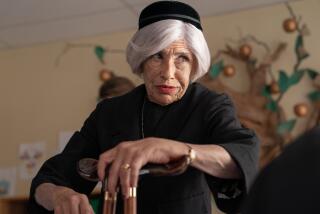Review: ‘The Quick’ taps a tired vampire vein in gothic lit
Vampires have become so prevalent in fiction and film that it’s increasingly difficult to wring any new changes on such a hoary supernatural trope. A few recent writers have successfully risen to the challenge — among them the Swedish novelist John Ajvide Lindqvist with “Let the Right One In” and Glen Hirshberg, whose “Motherless Child” is one of the most original and striking vampire tales of recent years.
First-time novelist Lauren Owen plays it much safer with her debut, “The Quick,” which might have been assembled from a kit for aspiring writers of the supernatural gothic. Victorian London setting? Check. Decadent antiquarian atmosphere? Check. Attractively ruined, remote stately home inhabited by orphaned siblings? Check. Decorous frisson associated with the love that formerly did not dare speak its name? Check. Exclusive yet sinister London gentlemen’s club that mysteriously does not serve meals? Check. Streetwise urchins living in the employ of a benign, Fagin-like mistress? Check.
“The Quick” arrives with effusive praise from Kate Atkinson, Tana French, Hilary Mantel: the trifecta of British blurbers. This no doubt boosted sales but results in an inevitable letdown on reading the actual book. Owen studied English literature at Oxford, received master’s degree in creative writing from the University of East Anglia and is now pursuing a PhD. In interviews, she’s said that her earliest writings were Harry Potter fanfic, and “The Quick” sometimes reads as though it were penned by a bookish Hermione Granger, eager to show off her knowledge of Gothic literature but oddly risk averse.
The novel opens with “a brief word here on the Aegolius, which bears the dubious distinction of being the most mysterious club in London.” Its membership limited to 52, “drawn exclusively from the oldest and most illustrious families in the country,” the Aegolius Club’s windows are always dark. Its members are rarely seen entering or leaving. There are no servants. Gaming and alcohol are banned from the premises.
Anyone who reads this concise description (on the first two pages) and does not immediately think “Vampires!” has probably never heard of vampires. In which case, this book is for you.
The story proper begins in the late 19th century at Aiskew Hall, a Yorkshire estate where young James Norbury lives with his sister, Charlotte. The children enjoy the sort of English childhood beloved of Anglophile readers — parents and governesses conveniently absent, vast overgrown grounds to wander, pleasantly musty-smelling antiquarian volumes to sniff. There’s even a priest hole, which features in an excellent, sinister scene early on. This incident brings to mind Chekhov’s admonition that if you introduce a priest hole in the opening chapters of a gothic novel, you must necessarily … But never mind. Perhaps you have never heard of vampires or priest holes.
James is sent away to school (in a dogcart, natch) and ends up at Oxford, where he writes bad poetry and makes the acquaintance of a handsome, aristocratic, rather fey young man named Sebastian — no, that was in “Brideshead Revisited.” Maybe the name was Algernon? No, that was James Norbury’s candy mouse. Bother. Christopher Paige, that’s his name, and he and James become good friends and fellow lodgers in a nice set of rooms. They see a play by Oscar Wilde, which encourages James to attempt playwriting, which he is rather better at than poetry. Christopher introduces James to his posh family, which includes a brother who’s a member of the Aegolius.
And James and Christopher fall in love. These early chapters describing their romantic relationship are beautifully done, with great warmth and humor, and the glorious, Beardsley-esque backdrop of London at its greenery-yallery best — so well done that when the not-so-surprising plot twist occurs, it’s a disappointment to find that one is reading a conventional supernatural gothic.
From this point on, Owen over-eggs the cake — an occupational hazard of contemporary writers of literature set in the gaslight era. In addition to the Aegolius Club, whose aristocratic members feed only on those without whom the world would be a better place, there is a lower-class band of bloodsuckers known as the Alia and led by Mrs. Prime, who takes in children at her squalid flat on Salmon Street.
The best scenes in the middle section of “The Quick” center on a streetwise urchin named Liza — one of “the undid,” as Mrs P.’s charges call themselves. The cast expands to include the Seraph, a legendary creature who may or may not be a vampire; James’ sister Charlotte, who after her brother’s disappearance goes in search of him; several amateur vampire-hunters, including a female trapeze artist; and Augustus Mould, an increasingly depraved human in the employ of the club who makes a surprising discover about vampire biology and becomes known as Doctor Knife.
This is all fun, but Owen’s pacing is sluggish, and several hundred pages involving subplots and minor characters (in particular the trapeze artist) could have been excised. The Seraph is mentioned a few times, then fades from the text. Still, the action picks up in the end, with a genuinely chilling denouement and a great last line. If you’re unfamiliar with both vampires and priest holes, you will no doubt be stunned to learn that a sequel is in the works.
Hand’s most recent book is the collection “Errantry: Strange Stories.”
The Quick
A Novel
Lauren Owen
Random House: 523 pp, $27
More to Read
Sign up for our Book Club newsletter
Get the latest news, events and more from the Los Angeles Times Book Club, and help us get L.A. reading and talking.
You may occasionally receive promotional content from the Los Angeles Times.








